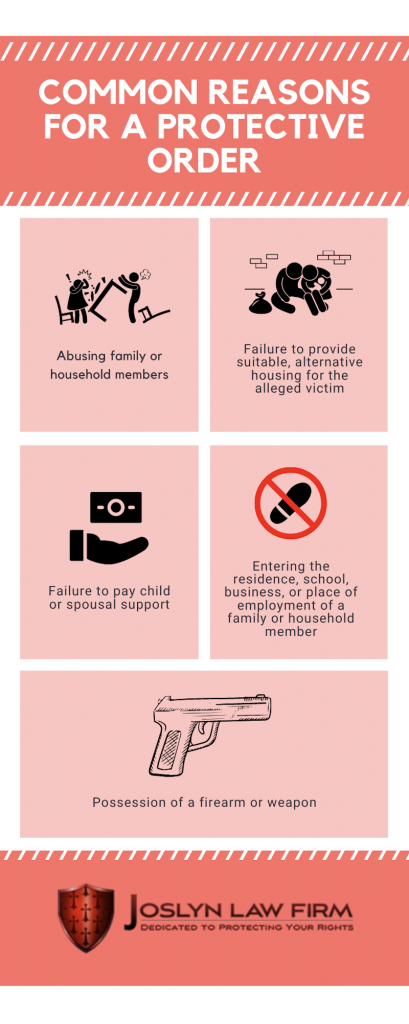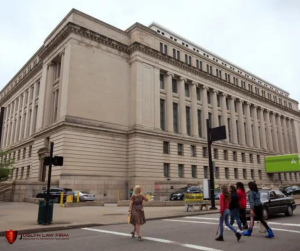Violating a Protection Order in Cincinnati
When a court in Ohio issues a protection order (also called a restraining order), the alleged offender (referred to as the respondent) is expected to comply with the injunctions established in the order. A violation of any of the requirements of the protection order can lead to the alleged offender facing criminal charges.
If you are facing violation of a protection order charges, Joslyn Law Firm is available to help you in your fight against them. Our firm handles Ohio criminal defense cases, and our team knows what to do to thoroughly review your case and evidence. We use this to create a defense against these accusations.
With Brian Joslyn as our head attorney, we are prepared to take on your case and represent you in court or during a settlement. You know you’re in good hands with Brian based on his awards for excellence and customer satisfaction.
These awards include:
- Membership with the National Association of Criminal Defense Lawyers
- Membership certificate from the American Association for Justice
- Better Business Bureau accreditation
- A Nationally Ranked Top 10 Under 40 Attorney Award from the national Academy of Criminal Defense Attorneys
Alleged protection order violations can arise from misunderstandings with or possibly even outright false allegations from alleged victims. In such instances, alleged offenders need to understand that judges often err on the side of caution and are more than willing to order strict sentences of incarceration to protect alleged victims.
With over 20,000 successful cases and a team that is passionate about criminal defense, Joslyn Law Firm wants to work towards getting charges dropped or reduced. Criminal charges can upend your life and overwhelm you and your loved ones. We’re ready to use our knowledge of Ohio criminal law to help you fight for your rights.
Lawyer for Protection Order Violations in Cincinnati, OH
Were you arrested on charges of allegedly violating the terms of a protection order in Hamilton County? It is in your best interest not to say anything to authorities until you have contacted Joslyn Law Firm.
Our team is dedicated to your defense and a non-judgmental approach as we examine evidence and investigate the scenarios surrounding your case. We want what is best for our clients, and we will treat you with the compassion you deserve.
Ohio protection orders have varying restrictions and can apply to different scenarios. Violating these orders can result in felonies or misdemeanors, and any of these charges can severely impact your life, family, and livelihood. Jail time and fines are the obvious impacts on your life, but the social fallout can also hurt you for years to come. No matter how daunting these charges may seem, you have the right to seek legal help.
Brian Joslyn is a criminal defense attorney in Cincinnati who represents clients in Anderson, Bridgetown, Delhi, Green, Harrison, Miamitown, Norwood, Springdale, Sycamore, and several other communities in southwest Ohio. Our lawyers at Joslyn Law Firm can provide an honest and thorough evaluation of your domestic violence case when you call (513) 399-6289 for a free, confidential consultation.
Information Center
- Types of Protection Orders and Violations in Hamilton County
- Protection Order Violation Penalties in Cincinnati
- Defenses for Violating a Protection Order in Cincinnati
- Ohio Resources for Violation of Protection Orders
- Protection Order Violation News in Cincinnati
- Q&As About Violation of Protection Orders in Cincinnati
- Lawyer for Violating a Protection Order in Cincinnati
Types of Protection Orders and Violations in Hamilton County
Ohio issues four kinds of protection orders:
- Temporary Protection Orders (TPOs) or ex parte protection orders are issued for the protection of alleged victims before full protection order hearings have taken place.
- Civil Protection Orders (CPOs)are issued by Domestic Relations Courts in domestic violence cases.
- Criminal Protection Orders are issued by criminal courts in multiple kinds of cases, including domestic violence.
- Anti-Stalking Protection Orders and Civil Stalking Protection Orders are issued specifically in cases of stalking.
An alleged violation of a protection order depends on the specific injunctions that were contained in the order. A few of the most common violations include, but are not limited to:
- Abusing family or household members
- Failure to provide suitable, alternative housing for the alleged victim
- Child custody violations
- Failure to pay child or spousal support
- Failure to seek counseling
- Entering the residence, school, business, or place of employment of a family or household member
- Possession of a firearm or weapon
Protection Order Violation Penalties in Cincinnati
The penalties for protection order violations are established under Ohio Revised Code § 2919.27. A first offense violation of a protection order is typically classified as a first-degree misdemeanor punishable by up to 180 days in jail and/or a fine of up to $1,000.
When an alleged offender has previously violated any kind of protection order, any subsequent violation becomes a fifth-degree felony offense. Convictions in such cases are punishable by up to 12 months in prison and/or a fine of up to $2,500.
If an alleged offender violates a protection order while committing a felony offense, then he or she will be charged with a third-degree felony. A conviction can result in a sentence of up to five years in prison and/or a fine of up to $10,000.
It is important to note that criminal charges related to violations of protection orders do not apply only to orders issued in Ohio. Alleged offenders can also be arrested for violating protection orders issued by the courts of other states.
Defenses for Violating a Protection Order in Cincinnati
There are several defenses for violating a protection order in Cincinnati:
Unintentional Violation
A defense lawyer can argue that their client did not willfully violate the protection order. It is not outside the realm of possibility that the two parties involved in a protection order would happen to show up at the same place. A lawyer could set out to prove that the alleged offender did not deliberately violate the order. The defense rolls out more smoothly if the alleged offender left the scene upon realizing that the other party was also there.
Lack of Knowledge
This is a case where ignorance of a law can be used as a defense—without knowledge of the restraining order, an individual cannot be held in violation of the order. With this defense, the alleged offender’s lawyer will have to prove a lack of knowledge.
Ideally, evidence to support this claim will stem from the fact that the alleged offender was not present at the hearing where the judge granted the protection order, the alleged offender did not receive a copy of the order via mail (as should happen when the subject is not present at the hearing); and/or a law enforcement officer did not show up at the scene of a previous violation to inform the alleged offender of the issued restraining order.
False Accusation
Although judges tend to err on the side of caution when it comes to accusations of protection order violations, they also know it is possible for an individual to falsely accuse another of this offense. A defense attorney can talk to a client who has been falsely accused of violating a protection order and investigate the circumstances of the alleged investigation to find evidence that disproves the allegation.
Illegal Restraining Order
A protection order can only be upheld if it is legal in the eyes of Ohio law. This means that a judge would have to have lawfully issued the order based on probable cause.
Ohio Resources for Violation of Protection Orders
Hamilton County Court of Domestic Relations
The Domestic Relations Division of the Hamilton County Court of Common Pleas handles cases involving the protection of victims of domestic violence as well as other matters. On this section of its website, you can download such forms as Petitions for Domestic Violence Civil Protection Orders, Motions to Modify or Terminate a Domestic Violence Civil Protection Order, and Motions for Contempt for Violating a Domestic Violence Civil Protection Order.
Hamilton County Court of Domestic Relations
800 Broadway St.
Cincinnati, OH 45202
(513) 946-9000
Ohio Domestic Violence Network (ODVN) Legal Resources
The ODVN is a website for domestic violence victims, and they provide resources for victims and educators. This page offers self-help manuals for survivors to learn about protection orders, criminal convictions, money-related issues, and more. The ODVN also offers a manual for those survivors who are currently incarcerated.
The Supreme Court of Ohio Domestic Violence Program
This resource offers quick links to a variety of state and federal resources to those dealing with stalking, sexual assault, and other forms of domestic violence.
Hamilton County Clerk of Courts – Record Sealing/Expungement
Those with a criminal record or an arrest record may be able to get their record sealed. There are time limits for when someone can apply for this process, depending on the offense they were convicted for.
The Supreme Court of Ohio Protection Order Overview
Those in need of a protection order can review information compiled by the state’s Supreme Court. This guide offers basic information on types of order, the circumstances in which someone may obtain a certain type of order, and various state and federal laws that may be relevant to the case. It also includes information about penalties and offenses covered by each type of order.
Protection Order Violation News in Cincinnati
Nov. 5, 2020
Cincinnati Landlord Jailed for ‘Stalking’ Woman Tenant in Violation of Court Protection Order
A Cincinnati landlord was under a court protection order to stay away from a tenant, but he allegedly violated the restraining order by showing up at the alleged victim’s place of work. The man, John Klosterman, had already reached a settlement (for sexual harassment of female tenants), which established the protection order that Klosterman allegedly violated in multiple incidents over two months following the settlement. In November, the landlord again violated the protection order and was again charged with menacing by stalking and violating the order.
John Klosterman’s bond for his most recent protection order violation was set at $150,000, and he will be required to wear an electronic monitoring device. The probation department is placing a device in the stalking victim’s home. It will instantly alert law enforcement if Klosterman comes within two miles of her home.
Feb. 7, 2020
Hundreds More Seek Civil Protection Orders in Montgomery County
The Dayton Daily News reported a 40% increase in civil protection orders over a four-year span. Domestic violence restraining orders comprise over 50 percent of the caseload of the Montgomery County Domestic Relations Court. Judge Denise Cross commented that the number of protection order violations is exceedingly small, but the period of greatest potential for violations is immediately after the order is given to the alleged abuser, and it is not uncommon for this to serve as a trigger for violence.
Q&As About the Violation of Protection Orders in Cincinnati
Q: What Constitutes a Violation of a Protection Order in Ohio?
A: A person who violates the terms of an issued protection order or approved consent agreement as per ORC § 2919.26 or ORC § 3113.31; or who violates a protection order issued as per ORC § 2151.34, ORC § 2903.213, or ORC § 2903.214; or who violates a restraining order that another state’s court issued is considered to be in violation of a protection order in Ohio.
Q: What Are the Punishments for Protection Order Violations in Ohio?
A: In Ohio, protection order violations are charged as misdemeanors of the first degree. Punishment could include up to six months in jail and up to $1,000 in fines. However, if you were previously convicted of protection order violations, or you have a history of two or more violations of menacing, aggravated menacing, aggravated trespass, or stalking against the current alleged victim, you will face fifth-degree felony charges. Punishment for this charge includes imprisonment of between six and 12 months, as well as a fine of up to $2,500. If you allegedly violated the protection order in the process of committing a felony, you could be charged with a felony in the third degree, which corresponds with a prison sentence of between one and five years, as well as a $10,000 fine.
Q: Will I Go to Jail for Violating a Protection Order in Ohio?
A: You could go to jail for up to six months for violating a protection order in Ohio. If you have previous protection order violations, you could face time in prison, between six and 12 months.
Q: Are There Defenses to Ohio Charges of Violating a Protection Order?
A: Yes, your attorney can present any of several defenses as appropriate to your case. They could argue that you did not know about the protection order. They could also argue that the protection order was not lawful, and therefore, could not be violated. Possibly, it could be argued that the alleged victim fabricated the violation and falsely accused you of the offense. Finally, your lawyer could present to the court that the violation was unintentional.
Q: Can I Reduce Charges of Violating a Protection Order in Ohio?
A: Yes, it is possible that your lawyer could get your criminal charges for violating a protection order reduced—perhaps even dismissed. Your attorney will investigate the specific details of the allegations against you and craft a strategy for delivering the best outcome for your case.
Q: Where Can I Find More Information About Protection Orders in Cincinnati?
A: You can find more information about protection orders in Cincinnati by visiting the Hamilton County Court of Domestic Relations. Another source for Cincinnati protection orders is the Ohio Crime Victim Justice Center (OCVJC), which works to protect the rights of state and federal crime victims.
Lawyer for Violating a Protection Order in Cincinnati
If you have been arrested on charges of allegedly violating a protection order in Hamilton County, do not make any kind of statement to authorities without legal representation. Joslyn Law Firm can investigate the specific circumstances of your case and fight to possibly get your criminal charges reduced or dismissed.
Cincinnati criminal defense attorney Brian Joslyn defends clients all over southwest Ohio, including Blue Ash, Colerain, Forest Park, Miami, Montgomery, Reading, Springfield, Symmes, and several surrounding areas.
You can receive a full review of your case to help understand your legal options as soon as you call (513) 399-6289 or fill out an online contact form today for a free consultation.

























